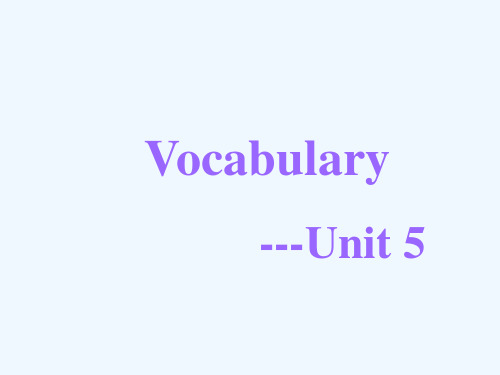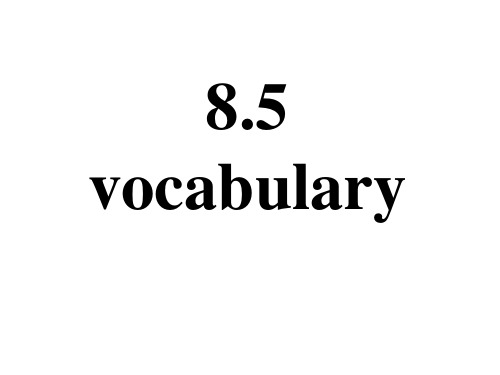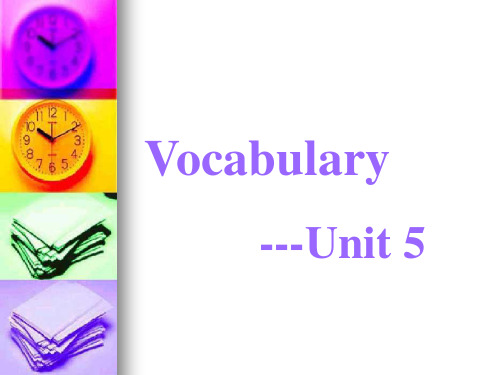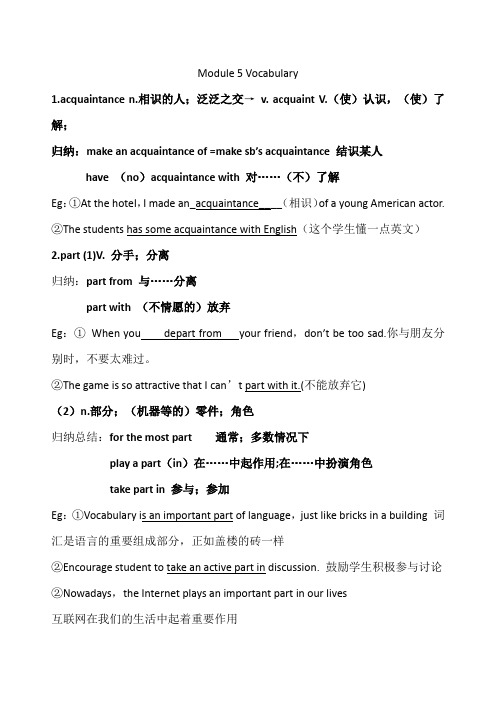m8u5 vocabulary
- 格式:pptx
- 大小:1.15 MB
- 文档页数:32

课型:新授课教学目标:1。
to develop an understanding of suffixes.教学方法:任务性教学法教具准备:课件教学步骤:教师活动,学生活动,个性化补充。
step 1: revision(4)do the patients need to pay for the treatment?step 2: presentationstep 3 gamesdivide the students into groups of four . take turns to guesspunish organizepunishment organizationkind uglykindness ugliness教学反思:[当堂巩固]一.根据汉语提示完成下列单词:5.many people are busy getting ready for the ______(庆祝).二.用括号内所给单词的正确形式填空:5.they need good _______(treat). but they are too poor to pay for it. 10.i think there’re too many _______(advertise ) on tv these days. 三.翻译句子:1.他的母亲因为生病需要手术,所以医生决定下周动手术。
2. 她总是看上去很高兴,因为她的内心充满喜悦。
3. 那家公司在电视上已登了广告。
我看过他们的广告。
4. 我昨天受到一封邀请信。
是tom邀请我参加下星期六他的生日派对5. 医生的职业是治疗病人。




Module 5 Vocabulary1.acquaintance n.相识的人;泛泛之交→v. acquaint V.(使)认识,(使)了解;归纳:make an acquaintance of =make sb’s acquaintance 结识某人have (no)acquaintance with 对……(不)了解Eg:①At the hotel,I made an_acquaintance____(相识)of a young American actor.②The students has some acquaintance with English(这个学生懂一点英文)2.part (1)V. 分手;分离归纳:part from 与……分离part with (不情愿的)放弃Eg:①When you depart from your friend,don’t be too sad.你与朋友分别时,不要太难过。
②The game is so attractive that I can’t part with it.(不能放弃它)(2)n.部分;(机器等的)零件;角色归纳总结:for the most part 通常;多数情况下play a part(in)在……中起作用;在……中扮演角色take part in 参与;参加Eg:①Vocabulary is an important part of language,just like bricks in a building 词汇是语言的重要组成部分,正如盖楼的砖一样②Encourage student to take an active part in discussion. 鼓励学生积极参与讨论②Nowadays,the Internet plays an important part in our lives互联网在我们的生活中起着重要作用3.expand Vt&Vi扩展,膨胀→n. expansionExpand knowledge of foreign countriesexpand domestic demand 扩大内需4.tolerant 容忍;忍受(put up with)Those who know how to tolerate others can naturally lead a happy life 那些懂得容忍的人自然可以过得幸福→adj. tolerant 宽容的,容忍的→n. tolerance 宽容be tolerant of 容忍;宽容5.share 分享;共担share(in)sth 分摊/分享某事share sth with sb 与某人公用/分享某物Eg:①I try to get the kids to share (in)the house work②I have to share all my toys with my younger sisters.我不得不与妹妹们分享我所有的玩具6.failure n.失败者[c]失败;故障反义词: success①cheer up!As we know,failure(失败)is the mother of success②The patient died of heart failure(心脏衰竭)③The engine failure 发动机故障→f ail Vt.&Vi.失败;不能;没有通过(考试)①we tried but failed 我们尝试了,但失败了②It is very important to find out why you failed to achieve you goal找到你没有实现目标的原因很重要7.take hold of 抓住,握住,捉住①The police finally took hold of the suspect警察终于抓住了犯罪嫌疑人②We should take hold of the opportunity to meet the challenge.我们应该抓住机遇迎接挑战。

8 B Unit 5 vocabulary 说课稿一、说课标、教材本课时为牛津英语八年级下第五单元第四课时,内容是通过给部分动词和形容词添加适当的词尾(“-ment”“-ness”“-ion”),将这些词转换成名词。
构词法的知识对于初中阶段的词汇学习意义重大。
在整套教材的各个阶段都有体现,比如“-ful”“-less”这组后缀,以“-y”结尾描述天气的形容词(sunny,rainy,c loudy…),“-dis”“-un”“-im”“-in”“-ir”等否定意义的前缀。
所有这些新课标的要求都是掌握并运用。
本课时教材以查字典添加适当后缀和用所给词的适当形式填空的形式呈现这部分内容。
分别体现了掌握和运用这两个层次的学习要求。
二、说学习对象初二年级的学生对英语构词法已经有了一定程度的了解,但是由于民工子弟入学基础差,学习积极性不高等特点,词汇依然是让大部分同学头痛的薄弱环节,特别是涉及到词性的变化和运用,那更是有“雪上加霜”的意味。
但是通过教师的引导和mini-dictionary的帮助,大部分同学还是能够完成本课时教学目标的。
三、说教学目标1、知识与技能:(1)认识并掌握“-ment”“-ness”“-ion”这些后缀(2)会正确运用此类后缀的词填空,掌握不同词性的不同用法。
(3)会运用此类词描述简单的图片,组词、造句。
2、过程与方法:(1)通过观察两则公益海报和一则广告认识这些后缀的词。
通过一个填字游戏回顾构词法知识并进一步了解本课时的目标。
(2)借助mini-dictionary的帮助,通过书本练习,记忆掌握此类词。
(3)通过更多的提高练习和课外补充,进一步操练此类词。
(4)通过看图说话和分组竞赛运用并归纳总结本课所学。
3、情感、态度、价值观:通过对构词法的回顾和学习,让学生意识到构词法对词汇学习的重要意义,减轻学生对词汇背诵的恐惧和厌烦感,鼓励他们多读,多用,多说,多写单词,并注意观察不同词性的不同用法。
牛津初中英语8 B Unit5 V ocabulary(Suffixes …-ment‟, …-ness‟ and‟-ion‟)Teaching goals●To develop an understanding of suffixes●To use proper verbs and adjectives in contextTeaching proceduresStep 1 Having a revisionTo begin with, answer my questions about Reading:What kind of people go to ORBIS for help? (Blind and poor people.)Can most cases of blindness be cured or prevented? (Yes.)What do ORBIS doctors do? (They treat many patients.)Do the patients need to pay for the treatment? (No.)How do ORBIS doctors treat them? (They operate on them.=They perform operations on them.) What is the relationship between “blind” and “blindness, “treat” and “treatment”, “operate” and “operation”?We can form nouns by adding suffixes …-ment‟, …-ness‟, or …-ion‟ t o some verbs and adjectives. Sometimes we need to change the ending of the verb or adjective before we add the suffix. happy-y+i+ness=happinesscelebrate-e+ion=celebrationinvite-e+ation=invitationWhat is a suffix?A suffix is a word ending. It is a group of letters you can add to the end of a root word*e.g. walking, helpful*A root word stands on its own as a word, but you can make new words from it by adding beginnings (prefixes) and endings (suffixes).For example, 'comfort' is a root word. By adding the prefix 'dis' and the suffix 'able' you can make new words such as 'discomfort' and 'comfortable'.Adding suffixes to words can change or add to their meaning, but most importantly they show how a word will be used in a sentence and what part of speech (e.g. noun, verb, adjective) the word belongs to.e.g. If you want to use the root word 'talk' in the following sentence:I was (talk) to Samina.You need to add the suffix 'ing' so that the word 'talk' makes better sense grammatically:"I was talking to Samina".There are various suffixes we use. Probably the most common are 'ed' and 'ing'.Here are some other suffixes and examples.Step 2 Finishing off Part AGo to page 82 to help Daniel to change verbs and adjectives into nouns, checking the answers with your partner. Think of more examples if you can.Step 3 Finishing off Part BFill in the blanks in Part B on page 82. Then read the e-mail aloud.Step 4 Doing additional exercises用括号中所给词的适当形式填空1. The children in poor countries have to _____ empty bottles to earn money. Last term ourschool made a _____ for children in poor areas. (collect)2. He could not pay his rent, so he had to _____ out. There was too much _____ of cars on the city roads. (move)3. Old people live a _____ life in our country. It‟s a great _____ for us to welcome you here. (happy)4. The teacher always _____ her students as her children. The new _____ for blindness makes some patients see again. (treat)5. Trav eling by coach makes us feel _____ all the way. There isn‟t much _____ here this year. (sick)(Keys: collect, collection; move, movement; happy, happiness; teats, treatment; sick, sickness ) Step 5 Homeworka. Read and learn these suffixes heart.Suffix Example Suffix Exampleed walk + ed = walked ness happy + ness = happinessing say + ing = saying al accident + al = accidentaler tall + er = taller ary imagine + ary = imaginarytion educate + tion = education able accept + able = acceptablesion divide + sion = division ly love + ly = lovelycian music + cian = musician mentexcite + ment = excitementfully hope + fully = hopefully ful help + ful + helpfulest large + est = largest y ease + y = easyb. Finish off the exercises in the Evaluation Handbook.。